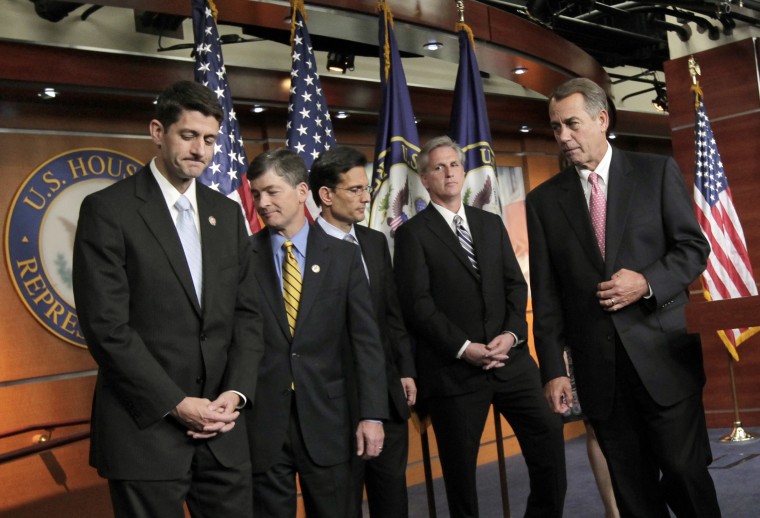It was 20 years ago this week that House Republican leaders, eager to make the case for a GOP takeover of Congress, presented the public with an agenda called the "Contract with America." Republicans knew at the time that the then-Democratic president wasn't popular, and the GOP was likely to make big gains in the midterms, but the party wanted to make the case for fairly specific proposals that Republicans would work on if elected.
In popular lore, the platform helped propel the GOP into the majority, though I think much of this is overstated -- most Americans weren't familiar with the "Contract" by Election Day 1994. Still, it was an era in which Republicans saw value in crafting and presenting policy ideas.
That era is long gone. NBC's First Read did a nice job this morning
noting that as far as the current crop of congressional Republicans are concerned, running on a non-existent policy platform isn't a problem.
In their midterm messaging, Republican say they want to repeal the federal health-care law, but replace it with what? They want to "secure" the border, but how do you accomplish that (and at what cost)? And they want to take the fight to ISIS in the Middle East, but aren't leaving the campaign trail to vote on authorizing U.S. military force there. [...] As Lou Zickar of the Ripon Society, a moderate GOP group, put it: The 1994 Contract with America "is a moment worth remembering because it was also a time when the GOP loudly and proudly proclaimed not what they stood against, but what they stood for."
For their part, GOP officials routinely say they have at least some priorities. House Speaker John Boehner (R-Ohio), for example,
sat down with ABC's George Stephanopoulos the other day, and the host asked what congressional Republicans intend to do with their power.
"We have focused like a laser for the last three and a half years on jobs and the economy," the Speaker who tried to repeal the Affordable Care Act several dozen times for no reason said. "Over 40 [jobs] bills sitting in the U.S. Senate. Let's start with those bills."
I hate to sound picky, but (a) there
really aren't over 40 jobs bills, no matter how many times Boehner falsely claims otherwise; and (b) for a Speaker who has literally no major legislative accomplishments after nearly four years on the job, this is a rather pathetic basis for an election-year platform.
Indeed, it only reinforces the degree to which Republicans have become a post-policy party, lacking any real regard for governing or substance.
But wait, my friends on the right will say, aren't Republicans going to win anyway? And if so, doesn't this prove it doesn't much matter?
In the short term, perhaps. Republicans have spent the last two years creating the least-productive Congress on record, even shutting down the federal government for reasons that no one can explain. They're unpopular; they're on the wrong side of many key issues; they have no meaningful policy ideas; they've gone to extraordinary lengths to alienate women and minorities; and they're nevertheless poised to take the Senate and expand their House majority. Not a bad deal for a party that's failed miserably at even the most basic governmental tasks.
And yet, as conservative Philip Klein
explained well yesterday, this approach to governing does a disservice to the party's broader ideological goals.
When I interviewed House Budget Committee Chairman Paul Ryan, R-Wis., he criticized Republicans who believed in playing it safe. "This idea of running as a referendum, assuming a wave, assuming you've got the wind at your back, assuming with an unpopular president we therefore by default will win, I don't buy that," he told me. "I think you gotta give people a reason to vote for you." Given Obama's unpopularity, Republicans could still have a politically successful election season without a clear agenda. But they will never win the policy debate if they run away from it.
As best as I can tell, GOP leaders don't really want a policy debate anyway, so they're comfortable with pushing it off indefinitely.
